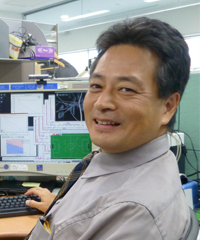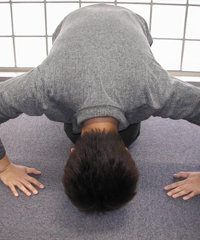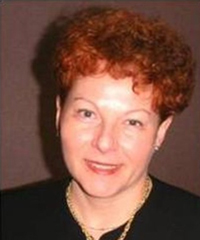基調講演
6月8日(火) 11:00~12:10 A会場
「社会と人工知能」

野田 五十樹 氏
(産業技術総合研究所 人工知能研究センター 総括研究主幹)
人工知能研究と社会との関わりについて議論していきたい。人工知能という言葉がうまれて65年がたち、いくつかの山と谷を経て、10年の間に、実用的かつ哲学的な技術・学問として研究が進んできた。本講演では、特に人工知能という技術と社会の関係について焦点を当てる。まず、人工知能技術の社会への応
用の例として、話者がこれまで携わってきたマルチエージェント社会シミュレーション(MASS)を取り上げ、その実例や可能性、今後の研究課題について紹介する。また、学術研究と社会との関わりについて、近年人工知能学会が重きを置いている倫理的側面など学術と社会とのかかわりを取り上げ、社会における学術研究の課題について、問題意識を共有したい。
[ 略歴 ]
1992年、京都大学大学院工学研究科修了後、電子技術総合研究所(現・産業技術総合研究所)に入所。博士(工学)。1994年よりロボカップの創立メンバーとして、シミュレーションリーグの立ち上げを行う。2014~17年にロボカップ国際委員会プレジデント。2000年より防災情報システムの国家プロジェクトに参画し、防災情報システム、災害シミュレーション、避難シミュレーションに取り組み、現在も各種社会シミュレーションの研究を展開している。2002年よりオンデマンド型公共交通のシミュレーションを開始、その研究の成果を元に2012年より実証実験を開始し、その社会実装を目指して、2016年、未来シェア設立。2020年より人工知能学会会長。
招待講演1
6月10日(木) 13:50~15:00 A会場
「データから見る 新型コロナ禍の社会」

鳥海 不二夫 氏
(東京大学 大学院工学系研究科 教授)
計算社会科学は,デジタル技術の発展により実現した新しい時代の社会科学である.従来時間とともに消えていった人々の行動を記録したビッグデータや,大規模なシミュレーション,デジタル技術を駆使した実験や調査など,新たに利用できるようになったデータや技術を駆使して社会をこれまでにない視点から定量的に研究する学際分野である.特に,人々の行動がビッグデータという形で記録されることにより,我々の視点を大きく変え,社会で何が起きている(いた)のかをより正確に知ることができるようになった.本講演ではCOVID-19がもたらした社会的の変化を中心に,計算社会科学によってどのように社会を分析していくかについて述べる.
[ 略歴 ]
2004年,東京工業大学大学院理工学研究科機械制御システム工学専攻博士課程修了(博士(工学)),同年名古屋大学情報科学研究科助手,2007年同助教,2012年東京大学大学院工学系研究科准教授,2021年同教授.
計算社会科学,人工知能技術の社会応用などの研究に従事.
情報法制研究所理事.人工知能学会,電子情報通信学会,情報処理学会,日本社会情報学会,AAAI各会員.
「科学技術への顕著な貢献2018(ナイスステップな研究者)」
主な著書に「強いAI・弱いAI 研究者に聞く人工知能の実像」「人狼知能 だます・見破る・説得する人工知能」「計算社会科学入門」.
招待講演2
6月9日(水) 11:00~12:10 A会場
「When AI Meets the Oldest Engineering Discipline」

Renate Fruchter 氏
(Director of the PBL Lab, Civil and Environmental Engineering Department, Stanford University)
[ 概要 ]
Builders represent one of the oldest engineering disciplines. Since the dawn of humanity people have built shelters, and then cities and infrastructure. They constantly shape and reshape our built environment and the way we live. We spend 90% of our time in buildings. Buildings consume 73% of U.S. electricity and generate 40% of U.S. greenhouse gas emissions. Building industry contributes a 5%-9% increase in the gross domestic product (GDP). According to UN and World Bank, approx. 56% of the world’s population (4 billion people) resides in urban areas today. By 2030, 2 billion people will have migrated to cities, creating unprecedented pressure on infrastructure and resources, that will impact the environment.
What role can AI play in the building industry as an enabler of a more ecologically, economically, and socially sustainable future built environment?
We will explore scenarios how AI can be an integral part of innovative holistic approaches in the building industry to address challenges such as climate change, globalization, digitalization, and skilled workforce shortage.
We are in the midst of the 4th industrial revolution that is transforming the building industry as well. It is a time when the physical and digital worlds merge; where the world becomes a big data set as everyone and everything that is connected to the Internet becomes data source; where AI, machine learning, VR/AR/MR/XR, robotics, autonomous mobility will continuously reshape how and where we live. Convergence of these emergent technologies can act as exponential accelerators. How will they transform the building industry? How will they empower the knowledge worker to explore broader solution spaces, augment co-creation and collaboration, and make evidence-based, agile, joint decisions? How will they: (1) increase productivity, engagement, well-being, safety, and create digital value chain; (2) replace labor-intensive processes; and (3) reduce cost, schedule, time to market, energy consumption, carbon emission?
[ 略歴 ]
Dr. Renate Fruchter is the founding director of the Project Based Learning Laboratory (PBL Lab). She is a lecturer in the Department of Civil and Environmental Engineering, and Senior Research Engineer thrust leader of “Collaboration Technologies” at the Center for Integrated Facilities Engineering (CIFE), at Stanford University. She received her Civil Engineering Diploma from the Institute for Civil Engineering, Bucharest, Romania. She received her M.Sc. and Ph.D. from the Technion – Israel Institute of Technology. Her R&D focuses on emergent collaboration technologies in support of cross-disciplinary, geographically distributed teamwork in education and corporate settings. Over the years her research team developed and deployed innovative collaboration technologies for virtual team building, synchronous and asynchronous knowledge capture, sharing and re-use, project memory, corporate memory, and mobile solutions for global teamwork and e-Learning. She is a designer of physical and virtual interactive learning and workspaces. She studies the relation between technology-people-place-process. These studies focus on the impact of technology on learning, engagement, knowledge work productivity, emergent work practices and processes, team dynamics, and assessment. She is the developer of the innovative “Architecture, Engineering, Construction (AEC) Global Teamwork” course launched in 1993 engaging university and industry partners worldwide. Her latest projects focus on: (1) big data analytics and visualization towards harmonizing occupant well-being and building sustainable performance; and (2) accelerating creativity and engagement in global teamwork through AI, VR, and parametric modeling optimization.